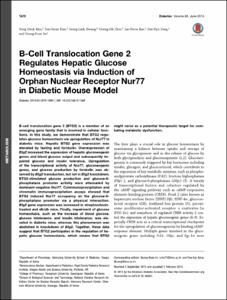B-Cell Translocation Gene 2 Regulates Hepatic Glucose Homeostasis via Induction of Orphan Nuclear Receptor Nur77 in Diabetic Mouse Model
- Keimyung Author(s)
- Bae, Jae Hoon; Song, Dae Kyu; Im, Seung Soon
- Department
- Dept. of Physiology (생리학)
- Journal Title
- Diabetes
- Issued Date
- 2014
- Volume
- 63
- Issue
- 6
- Abstract
- B-cell translocation gene 2 (BTG2) is a member of an emerging gene family that is involved in cellular functions. In this study, we demonstrate that BTG2 regulates glucose homeostasis via upregulation of Nur77 in diabetic mice. Hepatic BTG2 gene expression was elevated by fasting and forskolin. Overexpression of Btg2 increased the expression of hepatic gluconeogenic genes and blood glucose output and subsequently impaired glucose and insulin tolerance. Upregulation of the transcriptional activity of Nur77, gluconeogenic genes, and glucose production by forskolin was observed by Btg2 transduction, but not in Btg2 knockdown. BTG2-stimulated glucose production and glucose-6-phosphatase promoter activity were attenuated by dominant-negative Nur77. Coimmunoprecipitation and chromatin immunoprecipitation assays showed that BTG2 induced Nur77 occupancy on the glucose-6-phosphatase promoter via a physical interaction. Btg2 gene expression was increased in streptozotocin-treated and db/db mice. Finally, impairment of glucose homeostasis, such as the increase of blood glucose, glucose intolerance, and insulin intolerance, was elevated in diabetic mice, whereas this phenomenon was abolished in knockdown of Btg2. Together, these data suggest that BTG2 participates in the regulation of hepatic glucose homeostasis, which means that BTG2 might serve as a potential therapeutic target for combating metabolic dysfunction.
- Publisher
- School of Medicine
- Citation
- Yong Deuk Kim et al. (2014). B-Cell Translocation Gene 2
Regulates Hepatic Glucose
Homeostasis via Induction of
Orphan Nuclear Receptor Nur77
in Diabetic Mouse Model. Diabetes, 63(6), 1870–1880. doi: 10.2337/db13-1368
- Type
- Article
- ISSN
- 0012-1797
- Appears in Collections:
- 1. School of Medicine (의과대학) > Dept. of Physiology (생리학)
- 파일 목록
-
-
Download
 oak-aaa-01594.pdf
기타 데이터 / 1.43 MB / Adobe PDF
oak-aaa-01594.pdf
기타 데이터 / 1.43 MB / Adobe PDF
-
Items in Repository are protected by copyright, with all rights reserved, unless otherwise indicated.